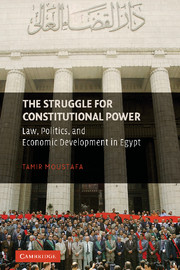Book contents
- Frontmatter
- Contents
- List of Figures and Tables
- Acknowledgments
- 1 Introduction: Law versus the State
- 2 The Politics of Domination: Law and Resistance in Authoritarian States
- 3 The Establishment of the Supreme Constitutional Court
- 4 The Emergence of Constitutional Power (1979–1990)
- 5 The Rapid Expansion of Constitutional Power (1991–1997)
- 6 Executive Retrenchment and an Uncertain Future (1998–2005)
- 7 Law, Development, and Democracy: A Critical Appraisal
- APPENDIX A SCC Justices and Commissioners
- APPENDIX B The Egyptian Constitution
- APPENDIX C Law 48 of 1979 Governing the Operations of the Supreme Constitutional Court of Egypt
- APPENDIX D Figures on Supreme Constitutional Court Rulings
- Bibliography
- Index
5 - The Rapid Expansion of Constitutional Power (1991–1997)
Published online by Cambridge University Press: 27 July 2009
- Frontmatter
- Contents
- List of Figures and Tables
- Acknowledgments
- 1 Introduction: Law versus the State
- 2 The Politics of Domination: Law and Resistance in Authoritarian States
- 3 The Establishment of the Supreme Constitutional Court
- 4 The Emergence of Constitutional Power (1979–1990)
- 5 The Rapid Expansion of Constitutional Power (1991–1997)
- 6 Executive Retrenchment and an Uncertain Future (1998–2005)
- 7 Law, Development, and Democracy: A Critical Appraisal
- APPENDIX A SCC Justices and Commissioners
- APPENDIX B The Egyptian Constitution
- APPENDIX C Law 48 of 1979 Governing the Operations of the Supreme Constitutional Court of Egypt
- APPENDIX D Figures on Supreme Constitutional Court Rulings
- Bibliography
- Index
Summary
“Mr. President, what does freedom of expression mean to you?”
Mubarak: “Freedom of expression means you can speak up, criticize, and write what you want, as long as it is not against the law.”
By the early 1990s, the Supreme Constitutional Court had become a significant force in the Egyptian political system. In the economic sphere, it played a leading role in overturning Nasser-era nationalization laws, with an early willingness to push the pace and the extent of compensation much further than the government had intended. In the political sphere, the SCC also issued surprisingly strong rulings that twice forced the dissolution of the People's Assembly and a complete restructuring of the electoral system for local and national elections. Throughout the 1980s, the interests of civil associations, opposition parties, and the SCC began to converge, and a judicial support network began to take shape.
These synergies were accelerated as the Court became more assertive under the leadership of Chief Justice ‘Awad al-Murr during the period from 1991 to 1997. Al-Murr led a new group of justices who were appointed to the SCC through its unique process of internal recruitment, replacing the justices who had been transferred from the regime-dominated Supreme Court in 1979. Under ‘Awad al-Murr, the SCC began to use international law to bolster its rulings, and it forged new institutional links with foreign jurists and international rights organizations. The SCC also made itself the focal point for reform efforts by continuing to open space for political activists.
- Type
- Chapter
- Information
- The Struggle for Constitutional PowerLaw, Politics, and Economic Development in Egypt, pp. 118 - 177Publisher: Cambridge University PressPrint publication year: 2007



